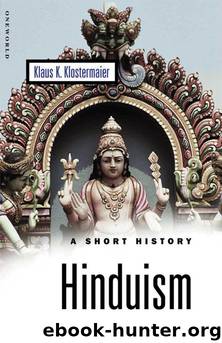Hinduism: A Short History by Klaus K. Klostermaier

Author:Klaus K. Klostermaier [Klostermaier, Klaus K.]
Language: eng
Format: epub
ISBN: 9780791470824
Amazon: 0791470822
Publisher: SUNY Press
Published: 2007-07-04T23:00:00+00:00
The next stage is Siddhānta-ācāra in which the Vāma-ācāra practices are no longer kept secret: “the sādhaka ... is not afraid of following socially disapproved practices openly. He is relentless in the pursuit of what he thinks to be true ... there is nothing that cannot be purified by the appropriate means.”79 The pañca makāras are the means to eliminate all conventional judgments and all distinctions of pure and impure, and to attain complete freedom. The highest stage is reached with kulācāra, the divya-bhāva: “The aspirant transcends the likes and dislikes of earthly life like God himself to whom all things are equal. Pity and cruelty are equally unmeaning in an ultimate reference, and so are also approbated and unapprobated conduct. Just as one of the Upaniṣads has said that to one who has attained Brahmā knowledge no sin attaches for any kind of antinomian act, so also the Tantras place the kaula above all moral judgment and put no prohibitions and restraints in his way, as they are unnecessary for one who has pierced the veil of space and time, process and differentiation. A kaula roams in all ācāras at will – being at heart a Śākta, outwardly a Śaiva, and in social gatherings a Vaiṣṇava. He sees himself in all things and all things in himself.”80
The Mahānirvāṇa Tantra describes the Bhairavī Cakra as a mode of worship of the Kaula.81 Ānanda Bhairavī is in the center of its meditation – the worshipers are considered as aṃśas of the Goddess during the performance itself. As a side effect all the different classes of demons flee away. Its main effect is that the “corrupt sinners of Kālī are liberated from the trammels of their sins.”82
Dīksā becomes of utmost importance in Tāntricism: a special initiation is necessary for anyone who wishes to enter the Tantra-ācāra. It is open to all without distinction of caste or sex, and even a Brahmin has to apply for it, otherwise he is not entitled to take part in the cakra. Terrible punishment is in store for those who take part in the rites without initiation and also for those who invite uninitiated persons.
A very important part is also played by the different rites of purification – especially purification of the pañca makāras. The Tāntrikas are aware that the enjoyment of these five ma involves the violation of all moral laws which are binding for ordinary men. They are the great temptations of ordinary people. Tāntricism is interpreted as a spiritual homoeopathy: by the very poison of the snake the snakebite is cured. But the administration of this antidote has to take place in a controlled way under an expert physician: the pañca makāras have to be purified and are to be taken only under the guidance of a guru. The purification takes place with a number of mantras, whose meaning is clear only to the initiated.83 Before taking any of the līlā the sādhaka has to recite the mantra – then only is the makāra a sacrament and not a sin.
Download
This site does not store any files on its server. We only index and link to content provided by other sites. Please contact the content providers to delete copyright contents if any and email us, we'll remove relevant links or contents immediately.
Fingersmith by Sarah Waters(2523)
Kundalini by Gopi Krishna(2165)
Wheels of Life by Anodea Judith(2128)
Indian Mythology by Devdutt Pattanaik(1922)
The Bhagavad Gita by Bibek Debroy(1915)
The Yoga of Jesus: Understanding the Hidden Teachings of the Gospels by Paramahansa Yogananda(1838)
Autobiography of a Yogi (Complete Edition) by Yogananda Paramahansa(1805)
The Man from the Egg by Sudha Murty(1795)
The Book of Secrets: 112 Meditations to Discover the Mystery Within by Osho(1656)
Chakra Mantra Magick by Kadmon Baal(1632)
The Sparsholt Affair by Alan Hollinghurst(1571)
Gandhi by Ramachandra Guha(1517)
Sparks of Divinity by B. K. S. Iyengar(1516)
Avatar of Night by Tal Brooke(1511)
Karma-Yoga and Bhakti-Yoga by Swami Vivekananda(1485)
The Bhagavad Gita (Classics of Indian Spirituality) by Eknath Easwaran(1469)
The Spiritual Teaching of Ramana Maharshi by Ramana Maharshi(1422)
Hinduism: A Very Short Introduction (Very Short Introductions) by Knott Kim(1361)
Skanda Purana (Great Epics of India: Puranas Book 13) by Bibek Debroy & Dipavali Debroy(1360)
